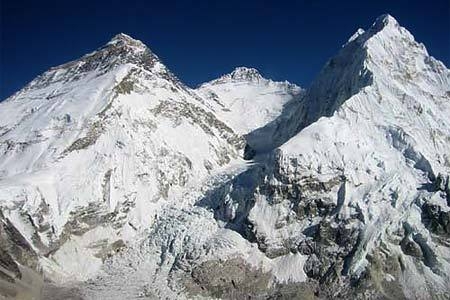Nepal's Everest spring season draws to a close before it begins

 1 / 8
1 / 8 Simone Moro
Simone Moro
The decision taken by the commercial expeditions to cancel the spring season comes in the wake of the tragic avalanche that killed 16 Sherpas and seems to have been influenced by a wide range of different factors. In the immediate aftermath a 4-day period followed during which no activity took place on the mountain to honour the dead, and while initial grief gave way to anger this was later extended to a week during which an ultimatum aimed at improving Sherpa working conditions was issued to the Nepalese government. While high-level talks took place in the country's capital, Kathmandu, initial eye-witness accounts mentioned Sherpas leaving the mountain as they wished the season to be ended as a mark of respect towards their dead colleagues. In a last-ditch attempt to rally the support of the Sherpa community, on Thursday 24 April Bhim Acharya, Nepal's minister of tourism, finally flew to Base Camp and promised, among other things, to keep the climbing permits valid for five years.
Despite these important economic questions, the desire to respect the dead and despite real safety concerns linked to the continuing danger of the serac looming above the Icefield, many believed a solution could still be found this season even if time was running out but it seems as if the decision now taken by some commercial expeditions to pull out has also been influenced by more sinister developments. There are indeed reports of Sherpas who wished to continue working on the mountain having been intimidated by a minority fraction of extremists – possibly even linked to Maost groups and with no ties to the Khumbu valley - who have used the tragedy as a pretext and means to gain politcal might. Without being able to guarantee the safety of their clients, and that of their loyal Sherpa on their return home, some commercial teams have been forced to halt their South side expeditions.
This latest developments are understandably worrying and the implications of the entire South side at mercy of minority activists are far-reaching. This scenario certainly does not bode well for the future of climbing on Mount Everest and for the Sherpa population in general whose livelihood, as Simone Moro reminded us recently, relies heavily on mountaineering.
EVEREST AVALANCHE
23/04/2014 -
Everest: Sherpa leave Base Camp, spring climbing season uncertain
20/04/2014 - Everest avalanche: search operation called off
19/04/2014 - Everest avalanche: interview with Simone Moro
18/04/2014 - Tragic Everest avalanche, numerous victims
| www | |
| www.alanarnette.com | |
| www.mountainguides.com | |
| www.outsideonline.com | |
| Tim Mosedale | |
| www.theguardian.com | |



 Copia link
Copia link







 See all photos
See all photos






















